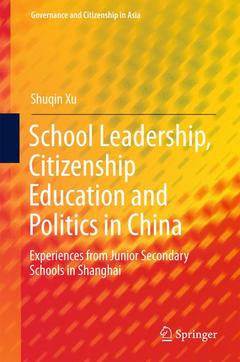Description
School Leadership, Citizenship Education and Politics in China, Softcover reprint of the original 1st ed. 2016
Experiences from Junior Secondary Schools in Shanghai
Governance and Citizenship in Asia Series
Author: Xu Shuqin
Language: English
Subject for School Leadership, Citizenship Education and Politics in...:
School Leadership, Citizenship Education and Politics in China
Publication date: 09-2016
Support: Print on demand
Publication date: 09-2016
Support: Print on demand
School Leadership, Citizenship Education and Politics in China
Publication date: 06-2018
Support: Print on demand
Publication date: 06-2018
Support: Print on demand
Description
/li>Contents
/li>Biography
/li>Comment
/li>
This book examines and theorizes the dynamics and complexities of leadership in citizenship education in junior secondary schools in Shanghai, China. Specifically, it examines from a macro- and micro-political theoretical perspective the interactions between principals and school party secretaries (SPSs), and how they respond to the demands of macro- and micro-political actors. This qualitative empirical research found four major school leadership/citizenship education scenarios in which principals and SPSs addressed the interests of different macro- and micro-political actors. Moreover, principals and SPSs enjoyed a complicated working relationship at the micro-political (school) level in which they collaborated to fulfill their responsibilities and respond to school macro- and micro-political actors, while competing for power over leadership in citizenship education. Principals? and SPSs? leadership in citizenship education was shaped by inter-related factors, including diverse influences in a multi-leveled world, the integration of politics and education, the demands of macro- and micro-political actors, and personal factors. To interpret these findings, this study proposes a theoretical framework for understanding leadership in citizenship education in China as a political exercise. This theoretical framework is useful for understanding the complexity of school and citizenship education leadership, the micro-political relationship between Chinese principals and SPSs, and their dynamic and complex interactions with macro- and micro-political actors.
Chapter 1 Introduction.- Chapter 2 CE and School Leadership: Theoretical Perspectives.- Chapter 3 Social Change, School Leadership and CE in China: A Historical Review.- Chapter 4 A General Picture of School Leadership and CE in Shanghai.- Chapter 5 School Leaders' Perceptions and Responses to the CPC-Led State's Policies and Requirements: Four Major Scenarios.- Chapter 6 Complicated Working Relationship between Principals and SPSs: Coexistence of Cooperation and Contention.- Chapter 7 Factors shaping School Leadership in CE.- Chapter 8 Discussion and Conclusion: School Leadership in CE as a Political Exercise.
Shuqin Xu graduated from Faculty of Education at the University of Hong Kong in 2013. Currently, she is a lecturer in Sun Yat-Sen University. Her main research areas include school leadership, citizenship education, education policy, education and social change in China.
Clarifies the complex relationship between Chinese school leaders and the Chinese Communist Party-led state as regards leadership in citizenship education Proposes a theoretical framework for understanding school leadership in citizenship education in the Chinese context Reveals how school leadership in citizenship education is shaped by multi-believed contexts and the interplays between macro- and micro-political actors Includes supplementary material: sn.pub/extras
© 2024 LAVOISIER S.A.S.




